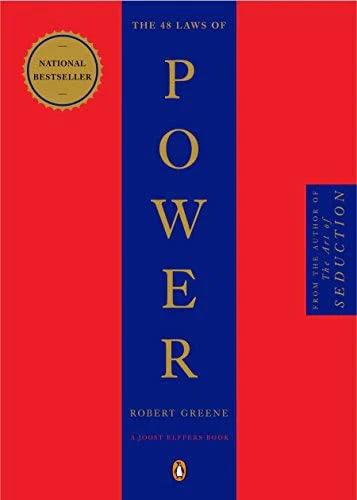48 Laws of Power by Robert Greene
Share with Friends

48 Laws of Power by Robert Greene:
Law 1: Never Outshine the Master
- Always make those above you feel comfortably superior.
- Example: A young courtier, wanting to make a good impression on the King, makes sure to always defer to the King and never outshines him in any way.
Law 2: Never Put Too Much Trust in Friends, Learn How to Use Enemies
- Be wary of friends-they may become rivals. Do not reveal everything to them, for allies have a way of becoming enemies.
- Example: A wealthy merchant befriends a rival merchant, but eventually the rival begins to see the wealthy merchant as a threat and turns against him.
Law 3: Conceal Your Intentions
- Keep people off-balance and in the dark by never revealing the purpose behind your actions. If they have no clue what you are up to, they cannot prepare a defense.
- Example: A politician is known for being vague in his speeches and not revealing his true intentions, keeping his opposition guessing and off balance.
Law 4: Always Say Less Than Necessary
- When you are trying to impress people with words, the more you say, the more common you appear, and the less in control.
- Example: A successful CEO is known for being brief and to the point in meetings, making sure to never waste time or appear verbose.
Law 5: So Much Depends on Reputation-Guard It With Your Life
- Reputation is the cornerstone of power. Through reputation alone you can intimidate and win; once it slips, however, you are vulnerable, and will be attacked on all sides.
- Example: A powerful CEO's reputation is tarnished by a scandal, causing his power to slip as investors and employees begin to doubt his integrity.
Law 6: Court Attention at All Costs
- Everything is judged by its appearance; what is unseen counts for nothing. Never let yourself get lost in the crowd, then, or buried in oblivion. Stand out. Be conspicuous, at all cost.
- Example: A young musician creates a distinctive image for herself, wearing eccentric clothing and playing unusual instruments, to ensure she always stands out in a crowded industry.
Law 7: Get Others to Do the Work for You, But Always Take Credit for It
- Use the wisdom, knowledge, and legwork of other people to further your own cause. Not only will such assistance save you valuable time and energy, it will give you a godlike aura of efficiency and speed.
- Example: A savvy politician hires a team of experts to research and draft policies, but takes credit for all the work done by his team, appearing to be a genius in the eyes of the public.
Law 8: Make Other People Come to You-Use Bait if Necessary
- When you force the other person to act, you are the one in control. It is always better to make your opponent come to you, abandoning his own plans in the process.
- Example: A company creates a new product that is so desirable that competitors come to them, begging to purchase the rights to use it.
Law 9: Win Through Your Actions, Never Through Argument
- Anyone can win an argument on paper. But true power stems from laying down the law through actions, not words.
- Example: A CEO who wants to change the company's direction doesn't argue with his employees, but instead sets an example by working hard and implementing changes himself.
Law 10: Infection: Avoid Step and Contagion
- You can die from someone else's misery- emotional states are as infectious as diseases. Foster a positive outlook, and do not get sucked into negative emotions around you.
- Example: A team leader avoids getting caught up in the negativity of a failing project and instead focuses on finding solutions, inspiring the team to turn things around.
Law 11: Learn to Keep People Dependent on You
- Ensure people are always dependent on you, so they will always come to you when they need help. This way you will be in control and they will be vulnerable.
- Example: A business owner becomes an expert in a certain field and offers unique services, making it so that clients are dependent on them and will always come to them for help.
Law 12: Crush Your Enemy Totally
- When you have your enemy at your mercy, it is essential to finish them off completely. This way, there is no chance of revenge and you will remain unchallenged.
- Example: A military leader, after defeating an enemy army, orders for all enemy soldiers to be executed, ensuring that there is no chance for a counterattack.
Law 13: Court Emotions and Play on Them
- Emotions are a powerful tool and can be used to control people. Court people's emotions, then use them to your advantage.
- Example: A politician runs an emotional campaign, playing on the fears and desires of the people to get elected.
Law 14: Pose as a Friend, Work as a Spy
- People will reveal their secrets to someone they trust, so gain the trust of people, then use the information to your advantage.
- Example: An intelligence agent poses as a friend to a target, gaining their trust and learning valuable information to be used in their operations.
Law 15: Crush Your Enemy Mentally
- It is much easier to defeat an enemy mentally than physically. Attack their spirit and confidence, making them easier to defeat.
- Example: A coach crushes the morale of the opposing team by constantly criticizing them in public, making it easier for his team to win the game.
Law 16: Do Not Build Fortresses to Protect Yourself- Isolation is Dangerous
- Isolation makes you vulnerable and weak. Instead, build networks of relationships and allies to help protect you.
- Example: A CEO builds relationships with other leaders in his industry, forming a network of allies to help protect his company.
Law 17: Keep Others in Suspended Terror: Cultivate an Air of Unpredictability
- Unpredictability puts people on edge and keeps them off balance, giving you an advantage. Keep others in a state of uncertainty.
- Example: A military leader keeps his enemies guessing by frequently changing his tactics and never revealing his plans, keeping them in a state of terror.
Law 18: Do Not Develop a Loyalty to Anyone
- Loyalty can blind you and limit your options. It is better to maintain your independence and be free to act as you wish.
- Example: A spy works for multiple countries, never developing a loyalty to any one of them, allowing them to maintain their independence and act as they see fit.
Law 19: Know Who You're Dealing With- Do Not Offend the Wrong Person
- Understanding the people you are dealing with is essential. Offend the wrong person and you could face consequences you never imagined.
- Example: A business leader makes sure to research and understand the people he is dealing with, avoiding any missteps that could offend the wrong person and harm his business.
Law 20: Do Not Commit to Anyone
- Avoid making promises or committing to others, as it limits your options and freedom to act.
- Example: A politician avoids making promises to specific groups, instead keeping his options open and free to make decisions that best serve his interests.
Law 21: Play a Sucker to Catch a Sucker - Seem Dumber Than Your Mark
- Appearing vulnerable and naive can be used as a tool to manipulate others. Seem like an easy target and let others underestimate you.
- Example: A con artist pretends to be gullible and naive, allowing their mark to let their guard down and make mistakes that the con artist can exploit.
Law 22: Work on the Hearts and Minds of Others
- To truly control people, you must control their hearts and minds. Use emotional manipulation to gain power over others.
- Example: A cult leader works on the hearts and minds of their followers, manipulating their emotions and beliefs to gain complete control over them.
Law 23: Concentrate Your Forces
- Focus your resources and efforts on one objective at a time, to maximize your chances of success.
- Example: A company focuses all its resources on one new product, putting all their efforts into making it a success.
Law 24: Play the Perfect Courtier
- Learn to read and understand the people you are dealing with, and then adapt your behavior to fit their needs.
- Example: A diplomat learns to read the emotions and desires of foreign leaders, adapting his behavior to fit their needs and gain their favor.
Law 25: Re-Create Yourself
- Constantly re-invent yourself and adapt to changing circumstances, so that you remain relevant and in control.
- Example: A successful musician continuously reinvents their image and style, staying relevant and in control of their body language.
Law 26: Keep Your Hands Clean
- Keep yourself free from guilt or blame, so that you remain untouchable and in control.
- Example: A politician avoids getting involved in any controversial or illegal activities, keeping their hands clean and remaining untouchable.
Law 27: Play on People's Need to Believe to Create a Cult-Like Following
- People have a strong need to believe in something, use this to create a following and gain power.
- Example: A religious leader creates a cult-like following by tapping into people's need to believe and providing them with a sense of purpose and community.
Law 28: Enter Action with Boldness
- Bold action creates an impression and allows you to seize the initiative. Be bold and take the first step.
- Example: A startup founder enters the market with bold action, quickly grabbing the attention of potential investors and customers.
Law 29: Plan All the Way to the End
- Plan for all possible outcomes, so that you are always prepared and in control.
- Example: A military commander plans for all possible scenarios in a battle, always prepared and in control of the outcome.
Law 30: Make Your Accomplishments Seem Effortless
- Make your successes seem effortless, so that people underestimate you and do not see the effort you put in.
- Example: A successful athlete makes their achievements seem effortless, leaving people unaware of the hard work and dedication they put in to reach their goals.
Law 31: Control the Options: Get Others to Play with the Cards You Deal
- Control the options available to others, so that they are limited and you have the advantage.
- Example: A negotiator limits the options available to their opponent, forcing them to play with the cards that have been dealt and giving the negotiator the advantage.
Law 32: Play to People's Fantasies
- People have powerful fantasies and desires, use these to your advantage and control them.
- Example: An advertising company plays to people's fantasies of success and happiness, selling products that promise to fulfill those desires.
Law 33: Discover Each Man's Thumbscrew
- Find what motivates and drives people, and then use it to control them.
- Example: A manager discovers what motivates each of their employees, using this information to create a highly motivated and productive team.
Law 34: Be Royal in Your Own Fashion: Act Like a King to be Treated Like One
- Project confidence and power, so that others will treat you as a powerful person.
- Example: A CEO projects confidence and power, creating a strong image that inspires respect and admiration from their employees and competitors.
Law 35: Master the Art of Timing
- Timing is essential in power dynamics, know when to act and when to wait.
- Example: A stock market investor masters the art of timing, knowing when to buy and sell to maximize their returns.
Law 36: Disdain Things You Cannot Have: Ignoring Them is the Best Revenge
- When you cannot have something, ignore it and show disdain for it. This shows your power and control.
- Example: A wealthy person ignores and shows disdain for material possessions they cannot have, showing their power and control over their desires.
Law 37: Create Compelling Spectacles
- Create spectacles that capture people's attention and imagination, giving you the power to control them.
- Example: A film director creates compelling spectacles that captivate audiences and give the director power to control the narrative and message.
Law 38: Think as You Like But Behave Like Others
- Blend in with others and adapt your behavior to fit in, while still thinking and acting according to your own beliefs.
- Example: A spy blends in with their target, adapting their behavior and mannerisms to fit in, while still working to gather information and complete their mission.
Law 39: Stir Up Waters to Catch Fish
- Create chaos and confusion to create opportunities for yourself.
- Example: An activist creates chaos and confusion to draw attention to their cause and create opportunities for change.
Law 40: Despise the Free Lunch
- Never accept anything for free, as it takes away your power and control.
- Example: A wealthy businessman never accepts anything for free, as it takes away their power and control over their finances.
Law 41: Avoid Stepping into a Great Man's Shoes
- Do not try to replace someone who is greatly respected and powerful, as you will only be seen as an inferior copy.
- Example: A new CEO avoids trying to replace a greatly respected and powerful predecessor, instead focusing on creating their own legacy and building their own reputation.
Law 42: Strike the Shepherd and the Sheep Will Scatter
- Target the leader or source of power, and the followers will scatter.
- Example: A military force targets the enemy's commander, causing the rest of the army to scatter and lose their coherence.
Law 43: Work on the Hearts and Minds of Others First
- Gain control of the hearts and minds of others before trying to control their actions.
- Example: A salesperson gains the trust and admiration of their client before trying to sell them a product, giving them more control over the outcome of the sale.
Law 44: Disarm and Infuriate with the Mirror Effect
- Reflect back people's own behavior and emotions to disarm and frustrate them.
- Example: A therapist uses the mirror effect to disarm and frustrate their client, helping them understand and work through their own emotions.
Law 45: Preach the Need for Change, But Never Reform Too Much at Once
- Advocate for change, but do not try to change too much at once, as it will create resistance and instability.
- Example: A social activist preaches the need for change, but only implements small reforms at a time, avoiding resistance and ensuring stability.
Law 46: Never Appear Too Perfect
- Do not appear too perfect, as it makes you vulnerable to attack and criticism.
- Example: A celebrity avoids appearing too perfect, as it makes them vulnerable to attack and criticism from the media and public.
Law 47: Do Not Go Past the Mark You Aimed For; in Victory, Learn When to Stop
- Know when to stop and avoid going too far, as it can lead to overextension and loss of control.
- Example: A company stops expanding and avoids going too far, recognizing the risk of overextension and the importance of maintaining control.
Law 48: Assume Formlessness
- Avoid having a set style or approach, as it makes you predictable and vulnerable. Instead, be adaptable and formless.
- Example: A martial artist avoids having a set style or approach, instead being adaptable and formless in their movements and techniques.
In conclusion, the 48 Laws of Power by Robert Greene is a guide for gaining and maintaining power in any situation. From cultivating an appearance of power to creating opportunities for oneself, these laws provide insight into the actions and strategies that can help you achieve your goals. However, it's important to note that the laws are not intended to be followed blindly, but rather to be used as a source of inspiration and guidance. Ultimately, the true power lies in the ability to balance these strategies with your own beliefs and values.

























































